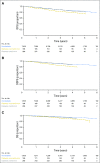Impact of Diabetes, Insulin, and Metformin Use on the Outcome of Patients With Human Epidermal Growth Factor Receptor 2-Positive Primary Breast Cancer: Analysis From the ALTTO Phase III Randomized Trial
- PMID: 28375706
- PMCID: PMC5455460
- DOI: 10.1200/JCO.2016.69.7722
Impact of Diabetes, Insulin, and Metformin Use on the Outcome of Patients With Human Epidermal Growth Factor Receptor 2-Positive Primary Breast Cancer: Analysis From the ALTTO Phase III Randomized Trial
Abstract
Purpose Previous studies have suggested an association between metformin use and improved outcome in patients with diabetes and breast cancer. In the current study, we aimed to explore this association in human epidermal growth factor receptor 2 (HER2 ) -positive primary breast cancer in the context of a large, phase III adjuvant trial. Patients and Methods The ALTTO trial randomly assigned patients with HER2-positive breast cancer to receive 1 year of either trastuzumab alone, lapatinib alone, their sequence, or their combination. In this substudy, we evaluated whether patients with diabetes at study entry-with or without metformin treatment-were associated with different disease-free survival (DFS), distant disease-free survival (DDFS), and overall survival (OS) compared with patients without diabetes. Results A total of 8,381 patients were included in the current analysis: 7,935 patients (94.7%) had no history of diabetes at diagnosis, 186 patients (2.2%) had diabetes with no metformin treatment, and 260 patients (3.1%) were diabetic and had been treated with metformin. Median follow-up was 4.5 years (0.16 to 6.31 years), at which 1,205 (14.38%), 929 (11.08%), and 528 (6.3%) patients experienced DFS, DDFS, and OS events, respectively. Patients with diabetes who had not been treated with metformin experienced worse DFS (multivariable hazard ratio [HR], 1.40; 95% CI, 1.01 to 1.94; P = .043), DDFS (multivariable HR, 1.56; 95% CI, 1.10 to 2.22; P = .013), and OS (multivariable HR, 1.87; 95% CI, 1.23 to 2.85; P = .004). This effect was limited to hormone receptor-positive patients. Whereas insulin treatment was associated with a detrimental effect, metformin had a salutary effect in patients with diabetes who had HER2-positive and hormone receptor-positive breast cancer. Conclusion Metformin may improve the worse prognosis that is associated with diabetes and insulin treatment, mainly in patients with primary HER2-positive and hormone receptor-positive breast cancer.
Figures
Comment in
-
Diabetes: Metformin in breast cancer.Nat Rev Endocrinol. 2017 May;13(5):251. doi: 10.1038/nrendo.2017.37. Epub 2017 Mar 31. Nat Rev Endocrinol. 2017. PMID: 28361930 No abstract available.
References
-
- Redaniel MTM, Jeffreys M, May MT, et al. Associations of type 2 diabetes and diabetes treatment with breast cancer risk and mortality: A population-based cohort study among British women. Cancer Causes Control. 2012;23:1785–1795. - PubMed
-
- Kaplan MA, Pekkolay Z, Kucukoner M, et al. Type 2 diabetes mellitus and prognosis in early stage breast cancer women. Med Oncol. 2012;29:1576–1580. - PubMed
Publication types
MeSH terms
Substances
Grants and funding
LinkOut - more resources
Full Text Sources
Other Literature Sources
Medical
Research Materials
Miscellaneous



